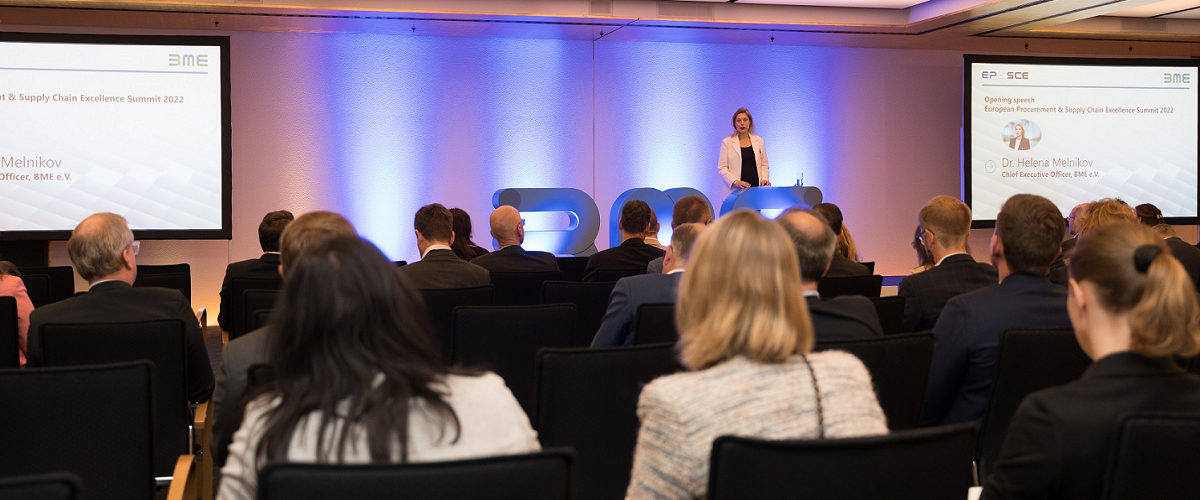Tuesday, July 12, 2022
EP&SCE: Top event with 200 CPOs of European companies
From efficiency to resilience. Procurement as the backbone and driver of innovation and transformation in times of dramatic social and geopolitical change: Executives from top European companies discussed these topics at the BME's European Procurement & Supply Chain Excellence Summit in Dresden on 21 June 2022.

The stage is set for this year's BME European Procurement & Supply Chain Excellence Summit in the Saxon state capital. The one-day conference was opened by Dr Helena Melnikov, Chief Executive Officer of the Association for Supply Chain Management, Procurement and Logistics (BME), in the presence of 200 procurement and supply chain managers from leading European companies. © fotografieren24/BME e.V.
This year's BME European Procurement & Supply Chain Excellence Summit in Dresden came to a successful close on the evening of 21 June. Central topics were the sustainable digital networking of all links in the value and supply chains as well as ways to strengthen the resilience of supply chains in the face of a weakening global economy.
"We are witnessing dramatic changes these days," emphasised Dr Helena Melnikov, Chief Executive Officer of the Association for Supply Chain Management, Procurement and Logistics (BME), in her opening speech. With the Covid 19 pandemic halfway over, Russia's invasion of Ukraine is causing the biggest upheaval in the global economy since the end of World War II, she said. "We have to come to terms with the fact that people are dying in a war on our doorstep, infrastructure is being destroyed on a massive scale, markets are fluctuating alarmingly and international supply chains are beginning to break down. Moreover, the war in Ukraine is fuelling global inflation and weakening the economy," Ms Melnikov continued.
Never since 1945 has there been so much need for political, economic and social dialogue. Industry, in particular, could no longer proceed on the principle of "business as usual". "Because previous lucrative procurement markets such as China have to be put to the test due to ongoing democracy and human rights violations, and old one-sided energy partnerships, as in the case of Russia, have to be replaced by new ones in the very short term," Ms Melnikov explained.
The developments that are now emerging require new answers and new ways of thinking from everyone. This is especially true for the economy. Regardless of whether it is a corporate group or a small or medium-sized enterprise, the challenges and risks are the same for everyone. A trend can currently be observed that could lead away from globalisation and towards more regional activities. For many companies, costs are no longer the only decisive factor. Security of supply and sustainable procurement are at least as important.
Purchasing is thus moving away from the DNA of cost efficiency, which has been practised for decades, towards resilience and sustainability. But it is also about re-evaluating the human factor in the supply chain, he said. "It is becoming increasingly clear that procurement is taking the lead when it comes to innovation, reinvention its own contribution to the business goals of the future," Ms Melnikov concluded.
In the subsequent plenary session, Anna-Kathrin Werkmeister, Vice President Procurement & Logistics Rolling Stock at Siemens Mobility GmbH, went into more detail on external and internal challenges for decision-makers in procurement and supply chain management. In her opinion, these included "survival in the VUCA world". Purchasing and SCM are faced with the question of how to deal with rapidly changing requirements and general uncertainties. Another challenge concerns the resilience of supply chains. This is about how procurement in particular can respond effectively to the ongoing supply chain disruptions caused by the Covid 19 pandemic and the war in Ukraine. In the case of digitalisation and automation, it is important how Industry 4.0 can be used for one's own business success beyond the associated process optimisations. The human factor is the key to successful digital transformation. With regard to purchasing, Ms Werkmeister said, according to the speech manuscript: "As procurers, we can wait until sales approaches us. Or we can lead the change and take the organisation with us."
According to Christian Holzer, Chief Procurement Officer and Head of Supply Chain at Siemens Energy, procurement can be a significant competitive advantage for any company. However, it depends on "how we do it".
Maayan Nissan, Head of Global Supply Chain Organisation of the US medical technology company Align Technology, pointed out in her statement the growing importance of cooperation with business partners. This is crucial for every company in terms of its own success. The resulting advantages are obvious: the quality of products and services increases; at the same time, innovation increases, while costs are optimised.
Ms Nissan also went into more detail about the negotiating style between business partners who are willing to cooperate. There are differences due to their different social motives or their interaction with others. Individualists try to maximise their own successes - without regard for their counterparts. Fair cooperators strive to maximise both their own and the other parties' outcomes and to ensure that resources are shared equitably. In contrast, competitors would have an interest in getting a better deal than their "opponent". According to Nissan's speech manuscript, they behave selfishly and often do not have the necessary trust to solve problems together. Last but not least, altruists put the needs and desires of their counterpart above their own.
Necessary conditions for successful cooperation between business partners are common goals, trust and active listening, the search for options for mutual gain and a focus on innovation.
/f/104752/3840x2560/53a1619a26/bme_knoor-1-retouche.jpg)
Roland Knoor
Sales Director